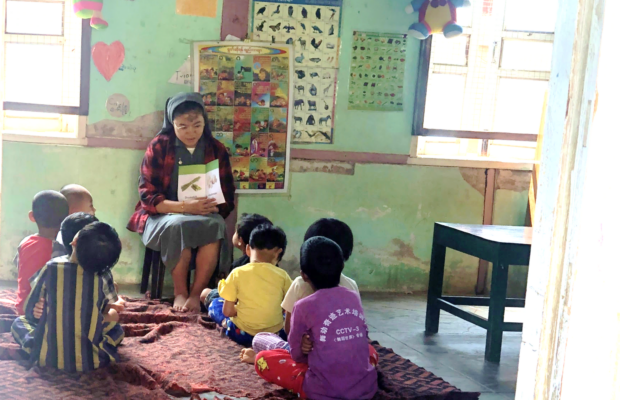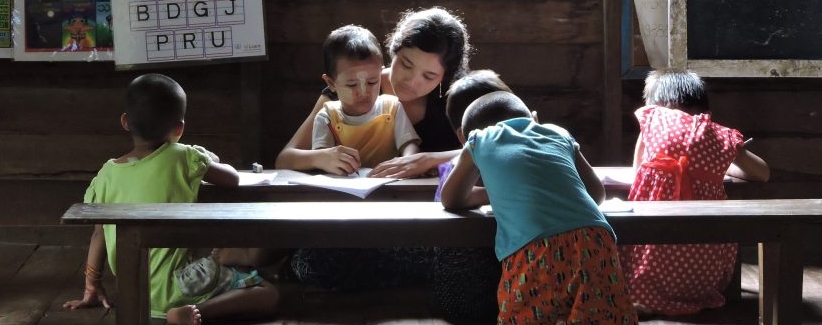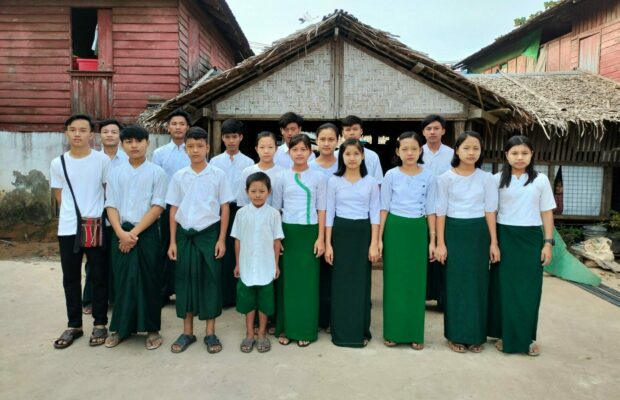
“In Myanmar, the worst is yet to come” – an exclusive interview
The Burmese do not even hope to regain democracy anymore, they just want a chance to fight. Under these conditions, the violence can only intensify. The future is dark and hopeless.
Passing through France at the beginning of September, Archbishop Marco Tin Win of Mandalay, the second city of Myanmar, Archbishop Lucas Dau Ze Jeimphaung of Lashio, the main city of Shan State in the eastern part of the country, Archbishop Noel Saw Naw Aye, auxiliary of Rangoon, the economic capital, and right-hand man of Cardinal Charles Maung Bo confided the sufferings of the Burmese people at the foot of Notre-Dame, to the chapel of the miraculous medal in Paris and to the grotto of Lourdes.
It was during this occasion that the three Burmese bishops were able to bear witness of the terrifying and despairing climate that has reigned in Myanmar since the military coup in February 2021 and the beginning of the civil war.
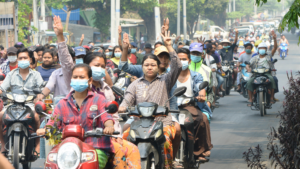
The Situation in Myanmar
Since 2021, Myanmar has been in the throes of a civil war between the ruling military and their pro-democracy opponents. What is the current situation?
Archbishop Marco Tin Win: When the military brutally regained power in February 2021, the whole country rose as one. The resistance to the coup was commensurate with the hopes of the people, who had voted overwhelmingly in November 2020 for the party that seemed to them most likely to bring freedom. It was on the day the government convened its new parliament resulting from free elections, February 1, 2021, that the junta staged its coup. No one imagined that the military would dare to overthrow power during a health crisis when the economy was at its lowest and the whole country was suffering. This was an act of great cruelty on the part of the army.
All citizens of the country demanded freedom. There were demonstrations everywhere, even in the most remote villages. It was unimaginable. The peaceful protest, called the civil disobedience movement, lasted three weeks before the military began firing live ammunition into the crowd. The first victim of the security forces was a woman who was witnessing the demonstrations in the street. Then, the shootings became daily. Soldiers began targeting Generation Z youths. Many were killed or jailed. These young people were forced to flee the big cities to save their lives. The army is afraid of their talents, especially their mastery of new technologies, and their zeal.
Young people were forced to flee the big cities to save their lives. The army is afraid of their capabilities.
Ethnic minorities in times of civil war
Buddhism is the state religion in Myanmar. How does the Catholic minority experience these political troubles?
Archbishop Noel Saw Naw Aye: If Buddhism is the religion of the majority in Myanmar – approximately 88% of the population -, it is no longer a state religion since 2008 and the constitution voted then (editor’s note: Buddhism had been proclaimed religion of State in 1958). Quite recently, the military has occasionally fought against ethnic organizations demanding more autonomy or independence in border states.
These ethnic groups were often Christian, and their persecution was even more violent. But today, arson and killings are happening everywhere, including in big cities like Yangon. And most of the victims are Buddhists. They now understand the persecution of Christians that took place in general indifference. This is perhaps one of the learnings that we can retain from this crisis: Buddhists or Christians, we are equal in suffering!
On April 8, the Mandalay Cathedral was raided in an act of intimidation and a show of force. Are Catholics perceived by the military as enemies?
Archbishop Marco Tin Win: It was the Friday before Holy Week. Armed soldiers locked up around a hundred worshipers inside the cathedral. They were looking for evidence that we were passing on information about bombings and killings in Christian villages. I don’t know if Catholics are seen as enemies of the army, but what is certain is that they don’t see themselves as such. The army, on the other hand, is against everyone. Catholics or Buddhists, we are all civilian victims of the army.
How has this context of violence transformed the mission of religious congregations in Myanmar? Are their lives in danger today?
Archbishop Marco Tin Win: Many nuns, helped by volunteers, organize clandestine clinics while the hospitals are empty. Medical personnel are massively involved in the civil protest movement and are persecuted and arrested by the army. In the Sagaing area, the villagers flee as soon as they see the army arriving. Priests and the religious experience the difficulties and sufferings of war firsthand as well. We take care of refugees. We give rice, vegetables and sometimes eggs and meat. The grounds of our churches have become reception centers for refugees.
Buddhists or Christians, we are equal in suffering! The grounds of our churches have become reception centers for refugees.
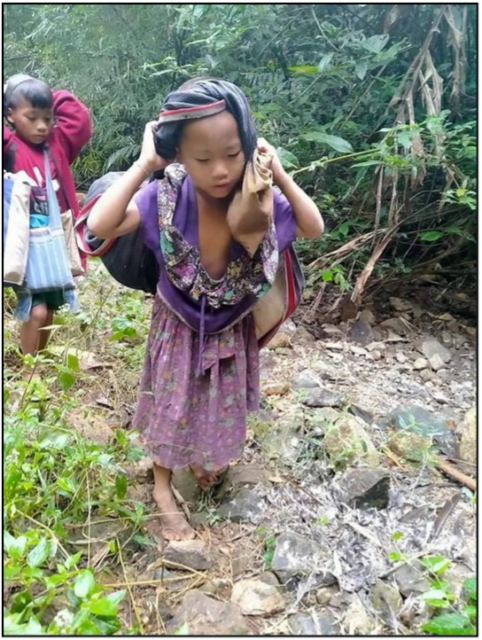
Deserted Burmese Schools
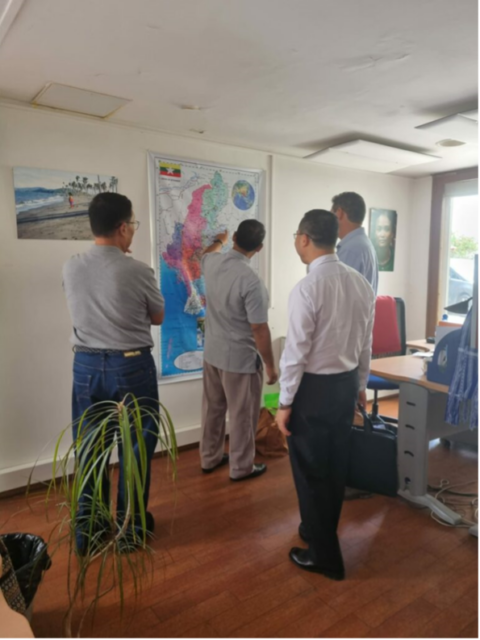
It has been written several times that the first victims of this war were children…
Bishop Lucas Dau Ze Jeimphaung: Many of them are terrified and traumatized by the violence they have witnessed, by the sound of fighting, helicopters, and bombardments. But the most serious thing is undoubtedly that the vast majority can no longer go to school. It is estimated that only one third of the school population has returned to school.
We cannot leave them like this; therefore we have mobilized so that all children may have a chance to study! We’ve been negotiating with armed groups of different ethnicities to create informal classes. Many priests, nuns, and volunteers have invested in this mission, as well as associations such as Children of the Mekong.
The most serious thing is undoubtedly that most children can no longer go to school. It is estimated that only a third of the school population has returned to school.
Unreasonable negotiations
Cardinal Charles Maung Bo has called since the beginning of the conflict for peace and dialogue. Is a dialogue with the junta possible?
Bishop Noel Saw Naw Aye: Cardinal Bo is my archbishop in Yangon. Even if he has no concrete solution to offer, his conviction is that reconciliation is the only peaceful solution. Such talk irritates many people in Myanmar, including Catholics. For many Burmese, there is no possible negotiation: the army must be destroyed. I understand that dialogue is difficult for those who suffer directly from the war, but when the cardinal speaks of reconciliation, it is above all a strong message intended for the military. This assumes that they are sincere, with a welcoming heart. Reconciliation can in no way be a weapon whose purpose is to eliminate the other group by trickery. But we have lived under the yoke of the army for more than 70 years, and the Burmese know that the army has never been sincere in its relations with the population.
In July the government executed by hanging four death row inmates, including two political opponents. The escalation of violence seems inevitable. How do you see the future?
Archbishop Marco Tin Win: Political prisoners are the current struggle: they are civilians, young people, democratic activists, elected members of Parliament. Most are good women and men who love their people and their country. The junta accuses them of keeping weapons at home, but no one believes them. They were kept in prison, tried without a lawyer, sentenced, and hanged. It had been 30 years since there had been an execution in Myanmar. How do you want to talk about peace and dialogue in these conditions? Trust has completely disappeared, and the military has proven that they do not respect any rights. The Burmese do not even hope to regain democracy anymore, they just want a chance to fight. Under these conditions, the violence can only intensify. The future is dark and hopeless.
Where should we look for hope?
Bishop Noel Saw Naw Aye: We are neither politicians nor businessmen. We are first of all men of the Church and our hope is in God. I know that out of darkness God can bring light! It is the faith that we must keep and our hope because, from a human eye, everything seems hopeless.
Everyone is talking about negotiations, but no one is ready to negotiate. As civilians, we cannot predict future political decisions, but we have one certainty: we are about to experience the worst. – Bishop Lucas Dau Ze Jeimphaung
Learn about our projects that support Myanmar
Learn more about our privacy policy here.


